Musings

Matisse and Diebenkorn in Baltimore
The above are some of the inspiring pairings of paintings by Matisse, always on left, and Diebenkorn, always on right, on view at the Baltimore Museum of Art. The exhibit is there until January 29 and then travels to San Francisco. It is a wonderful show. Each painting is beautiful on its own, and the pairings that demonstrate the influence of Matisse upon Diebenkorn are lovely. No heavy-handed decisions by the curators, Janet Bishop and Katherine Rothkopf. The viewer doesn't feel she is being forced into an unlikely way of thinking about the work. Instead, the viewer gets to appreciate all that she might have enjoyed before, and learn something new about each painter through the pairings.
The idea for this show began with the discovery of two drawings in the basement of the Baltimore Museum of Art, one by Matisse and the other, by Diebenkorn. The curators were captured by the links between the two pieces of art.

Mexico in Philadelphia
Just through January 8, 2017, the Philaelphia Museum of Art is presenting a wonderful exhibition of Mexican Art, Painting the Revolution: Mexican Modernism, 1910-1950. The show offers a lot. On display for you to think about are Mexican history, politics, and social-cultural change; the work of larger than life individuals, including artists, politicians, and heros of the people; several different art movements; Communism; Fascism in its many forms; the movement of artists across borders; and more.

Portraits of Some Human Interest at the Whitney
Can't say that I was thrilled by the exhibit, Human Interest: Portraits from the Whitney's Collection (runs through February 12, 2017). The geographical limitations of the American collection are a problem: One yearns for some portraits from outside our borders. I also wished for more paintings. The photographic contributions are important but I missed paint and the very special thing it can do when an artist works with another person in a studio. And maybe there are simply too many pieces spread over these two floors. Although the curators created a thematic scheme that should have provided some sort of guide and order, I too often wondered why a piece was in one section and not in other sections I had just seen. Too many pieces fall into too many of the curators' slots. Their scheme is not very useful. No question, there are interesting ideas about American portraiture at work here, but they didn't strike me as especially original. I have read these ideas before and seen them effectively illustrated.

A Visit with Agnes Martin at the Guggenheim and the Death of an Egyptian Woman
Until January 11, 2017, the Guggenheim Museum in NYC presents a marvelous retrospective of the paintings of Agnes Martin (1912-2004). Climbing the circling ramps of that unique space, the museum visitor not only looks at paintings but feels very up close to a person working. It is like having a visit with her and probably getting as close as one could have gotten to Martin in life.

What Is It about Eggs?
Eggs in paintings are irresistible. Their shape, range of subtle colors, and ways of reflecting light and casting shadows all easily engage painters and viewers. Eggs play well with others, both organic and inorganic objects. They inspire a variety of interesting still life compositions. And then there is their delicacy paired with a strong promise of life and good eating. Eggs suggest all kinds of meaning and narrative possibilities. Below is a slide show of egg paintings that have recently caught my eye.
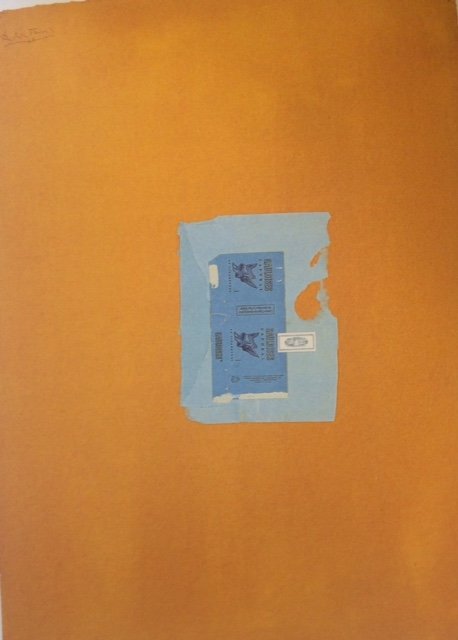
Wish I Still Smoked Gauloises Cigarettes
There is a stunning exhibition of Robert Motherwell's collages at the Paul Kasmin Gallery in Chelsea (on view at 293 Tenth Avenue until May 21st, 2016). Motherwell sets a simple thing like a cigarette wrapper in a background of beautiful color and thereby, makes it sing and change the viewer's heart rate.

Prints from Mexico
As promised, here are photographs of some of the prints I worked on in San Miguel, in the Gerardo Ruiz studio. I have a long way to go. Nonetheless, it was fun to jump into so many different says of working -- linoprint, intaglio etching, aquatint, monoprint -- in such a short period of time. And the fun continues. Just two days ago, I completed a day long tutorial on lithography at the Shoestring Press in Brooklyn. Today, I saw the glorious exhibition of Degas' monoprints at MOMA. The pieces in that show alone could inspire me for years.

Estudio Gerardo Ruiz, San Miguel de Allende, Guanajuato, Mexico
Just returned from wonderful Mexico -- 5 days in the amazingly big and energetic Mexico City, and 4 full weeks in the charming high desert town of San Miguel de Allende. There is lots to share about our time away. Most important for my art blog are the days with the Mexican artist, Gerardo Ruiz. For three weeks, I worked essentially every day in the studio of this professor of sculpture, printmaking, drawing and painting, and other media.
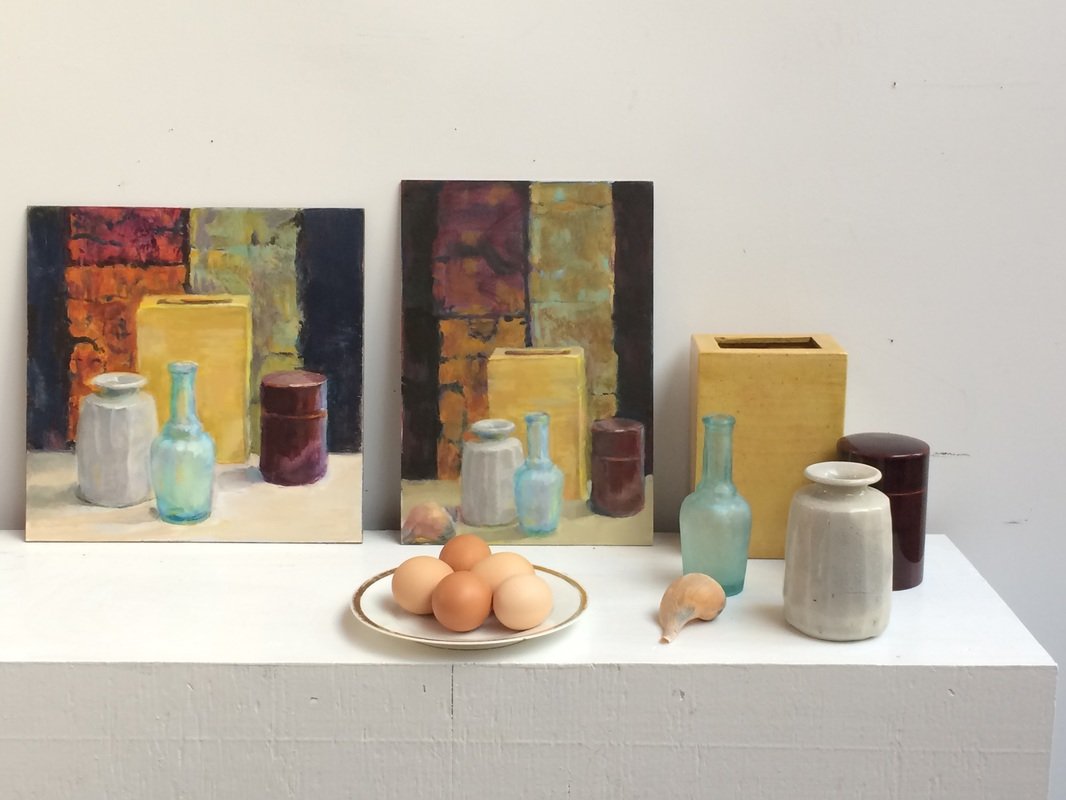
Still Life Waiting, Still Life Revisited
Took this photo in my city studio today. It shows completed still life paintings waiting to be hung, and still life objects waiting to be placed in new paintings. Having a record of this combination seemed important. And I liked the photo as a photo.

Picasso, Sculptor
Through February 7th of 2016, the Museum of Modern Art in New York (MOMA) presents a very special show of Picasso's sculptures. The curators bring together a large collection of objects arranged chronologically across Picasso's long career. It's a charming exhibition filled with large doses of creative energy, whimsy, deep appreciation of history, wit, and moments of simple elegance.
Quotation Becomes Art
“To live fully is to live with an awareness of the rumble of terror that underlies everything.”
— Ernest Becker
This quotation is brought to life by the art of Alberto Burri (1915-1995), now on view at the Guggenheim Museum. If you can get yourself to New York City, see this retrospective exhibition of this Italian artist's work. "Alberto Burri: The Trauma of Painting" is at the Guggenheim through January 6, 2016.
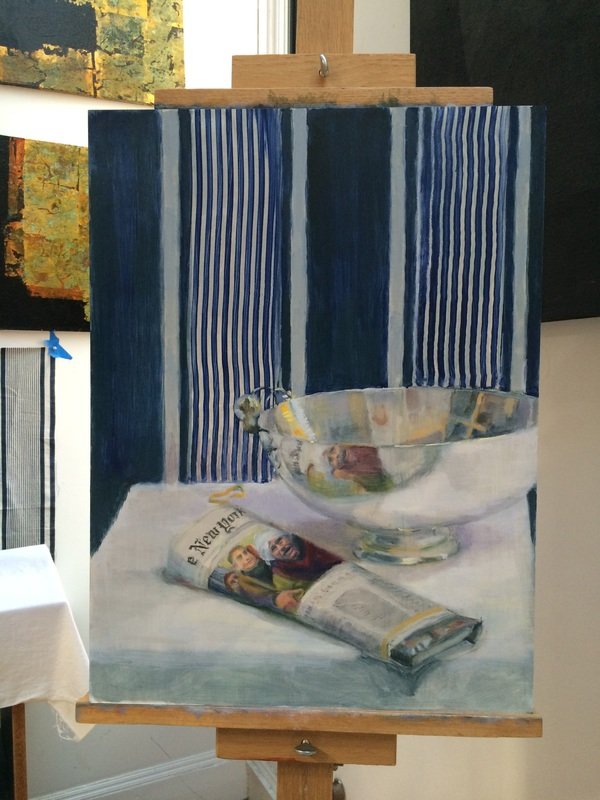
A Provocative Photo, a Silver Bowl, and a French Cloth
I haven't changed my mind about letting a painting stand on its own. If a painter needs to tell a story about her painting in order to make it worth looking at, there is a problem with the painting. But sometimes telling a backstory seems right.

How Many Inspirations Can a Little Painting Have?
My answer is many, many inspirations. And they may come from a variety of places and times. For the little painting posted here, I can claim and write something about at least two conscious sources of ideas and encouragement (God knows what happens unconsciously). The first is a 13th century Chinese painting by Mu Ch'i, a Zen practitioner; and the second, a 19th century wall fragment painted by Goya, at his home in Spain.
Jed Perl on "The Perils of Painting Now"
In his article in the September 24, 2015 issue of The New York Review of Books, Perl worries about contemporary painting and questions its significance. He finds it helpful to return to Lionel Trilling's Sincerity and Authenticity (delivered as lectures in 1970 and published in 1972). These essays on art help Perl make sense of what troubles him about much of what people are now calling paintings.
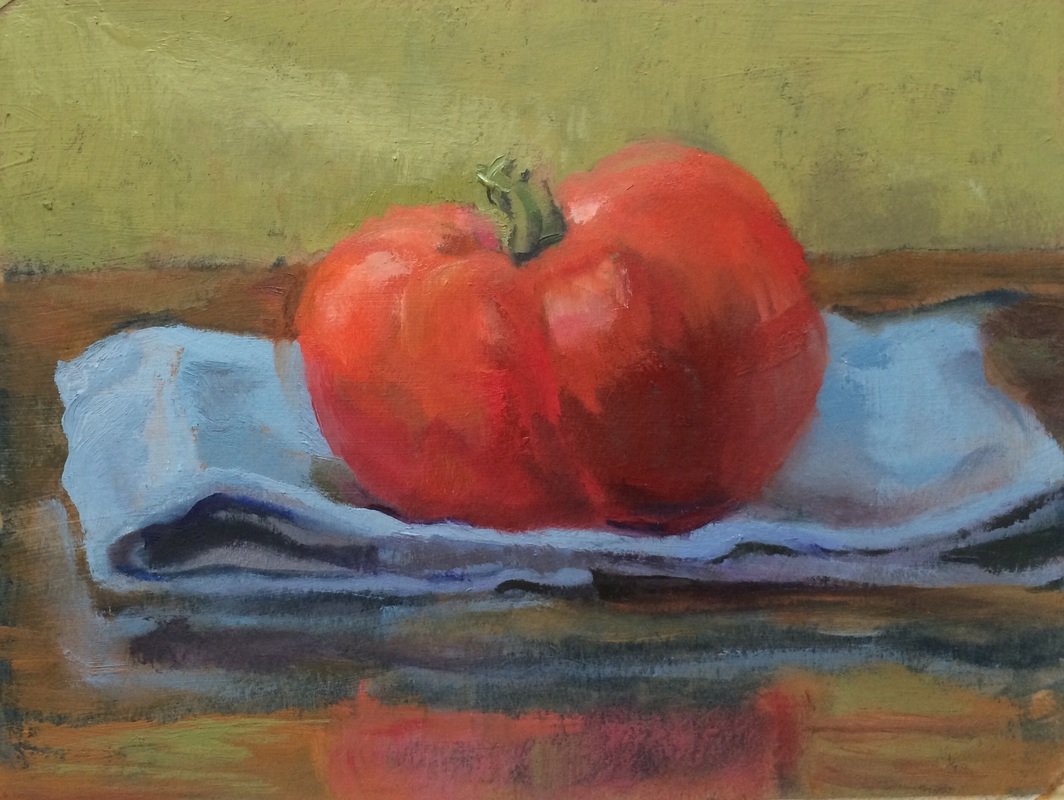
That Was No Apple in the Garden of Eden
I now know it for sure. Painting this still life made it very clear: it wasn't an apple that got Eve and Adam into trouble in Paradise. That fruit of temptation had to have been a tomato.
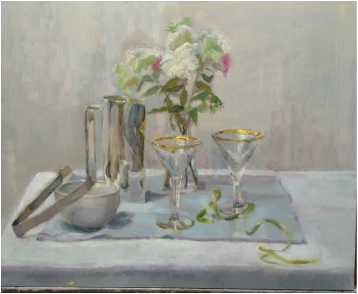
Inspired by the Ballet and Some Old Glasses
Earlier this summer, as part of the BardSummerscape program, I saw a performance by the Pam Tanowitz Dance Company. The program began with a piece called Broken Story (wherein there is no ecstasy). I was struck by the bright white and silver light that filled the stage as the dancers danced. I wanted to do a painting that included that light.

Edmund White on Cy Twombly: Art Beyond the Edges of the Studio
Earlier this summer, as part of the BardSummerscape program, I saw a performance by the Pam Tanowitz Dance Company. The program began with a piece called Broken Story (wherein there is no ecstasy). I was struck by the bright white and silver light that filled the stage as the dancers danced. I wanted to do a painting that included that light.

A Little More Manet
Here is a story about a painting that developed in a different way.
It started out in the usual way, the way other paintings had: I set up a still life with flowers.
Late spring/early summer flowers that I picked from my garden -- peonies, rhododendron blooms, and Siberian iris -- were the subject. I put them in a simple glass vase, and set it all on a cloth, on a table. I did a drawing in paint on the canvas and then a grisaille (working with just one neutral blue/grey color, I showed the darks, lights, and middle tones and created a three-dimensional effect on the canvas). I was off to a good, very familiar start. Me and my flowers in front of me.
Political Art
There are many views of what it means to do art that is political. Many arguments about what political art is, whether it can or should be done, whether any art could not be political. For me, a helpful approach to the controversial topic is offered by the wonderful artist, William Kentridge.
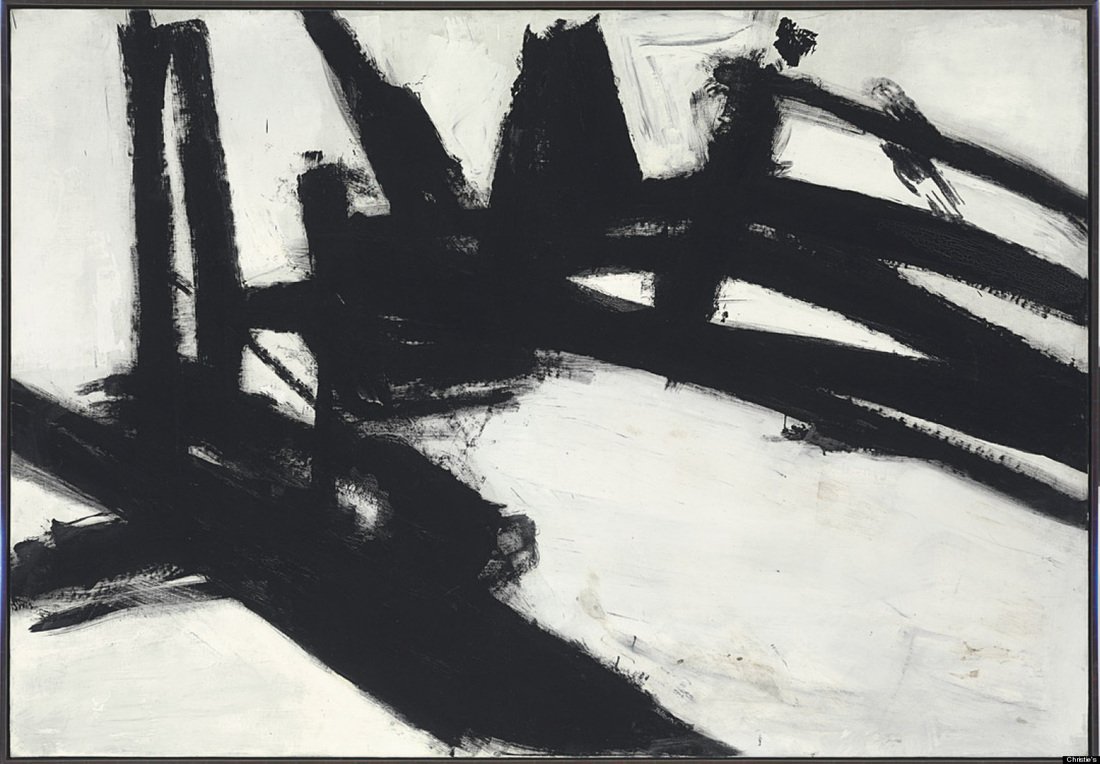
What is Art?
Franz Kline (1910-1962), an American painter and key figure in the Abstract Expressionist movement, had a wonderful way of answering that question. For him, it was all about giving.